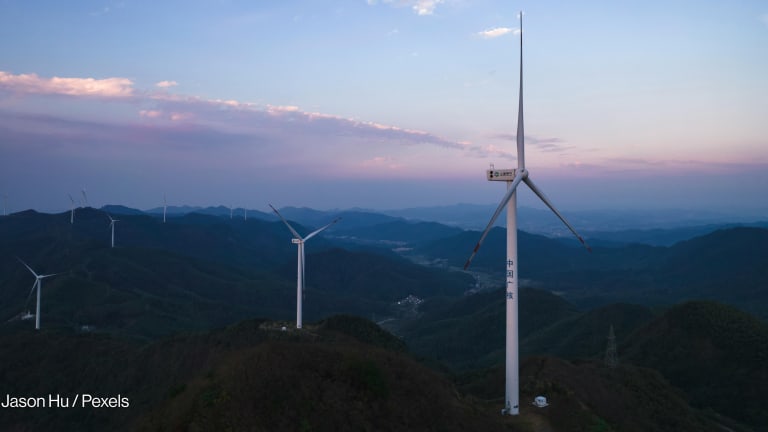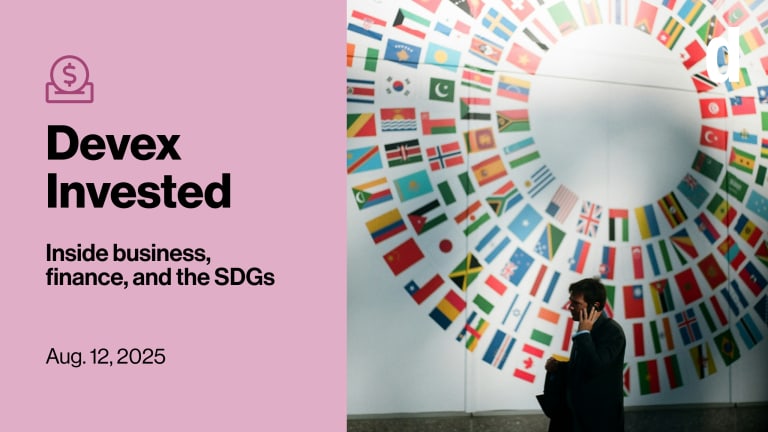
EDITOR’S NOTE: A version of this article was originally published by Devex in January 2012. This revised and updated version, co-written with Lorenzo Piccio, contains the latest information and analysis.
Barack Obama’s rise to the presidency in 2009 raised high hopes for a renewal of U.S. leadership on confronting global climate change.
“This is the moment when we must come together to save this planet,” the then presidential candidate said before a 200,000-strong crowd in Berlin, Germany, in July 2008.
Weeks after his election that November, then President-elect Obama pledged that his administration would mark a “new chapter in American leadership on climate change.” As president, his 2010 national security strategy would elevate climate change to the U.S. defense agenda, warning that it poses a “real, urgent, and severe” danger.
In September 2010, President Obama announced the Global Climate Change Initiative, joining Feed the Future and the Global Health Initiative in the administration’s series of core global development programs. The U.S. Agency for International Development later released its first-ever comprehensive climate change strategy that lays out agency priorities and activities through 2015. The USAID strategy document asserts that climate change is “expected to exacerbate existing development pressures” and helps explain the Obama administration’s emphasis on countering the effects of climate change.
GCCI aims to “foster a low-carbon future and promote sustainable and resilient societies.” Programming is organized around three pillars: (1) climate change adaptation, (2) clean energy and (3) sustainable landscapes. Climate change adaptation programs aim to assist low-income countries in reducing their vulnerability to the impact of climate change. Clean energy programs aim to reduce greenhouse gas emissions from energy generation and energy use by accelerating the deployment of clean energy technologies, policies and practices. Sustainable landscapes programming aims to reduce greenhouse gas emissions from deforestation and forest degradation.
President Obama’s proposed $837 million GCCI budget for 2014 allocates 26 percent for climate change adaptation, 54 percent for clean energy and 20 percent for sustainable landscapes. In addition to making investments in these three areas, GCCI intends to integrate climate change considerations into other relevant U.S. foreign assistance programs.

Click on the image to view a larger version
Excluding regional and multilateral programs, for 2014, the Obama administration has requested funding for 32 countries in Africa (11), Asia (10), Latin America and the Caribbean (9) and Europe (2). According to the U.S. government, it selected these countries based on criteria linked to each GCCI pillar. For adaptation funding, the U.S. prioritizes countries most vulnerable to the impact of climate change. Clean energy assistance targets countries with the potential for both emissions reduction and renewable energy development. Lastly, countries with high-priority forest landscapes qualify for sustainable landscapes assistance. Seven countries are slated to receive GCCI funding in each of the initiative’s three pillars: Indonesia, the Philippines, Vietnam, Bangladesh, India, Colombia and Peru.
In January 2011, USAID appointed a global climate change coordinator, responsible for harmonizing climate change programs across all bureaus in the agency. Both USAID and the State Department, which spearhead bilateral programs under GCCI, have been training staff on climate change issues and practices, building internal expertise and empowering those responsible for implementing climate change programming.
But with U.S. foreign aid still on the chopping block and Obama’s influence in Washington likely to diminish as his second term runs its course, it remains to be seen whether GCCI will have the staying power it needs to make a real impact. GCCI lacks the bipartisan support that President Obama’s other development priorities, food security and global health, have enjoyed over the past decade. Republican leaders still openly question the existence of global warming; polls also reveal that most Americans consider worries over climate change to be exaggerated.
Some in the climate community have even questioned whether GCCI still claims the full backing of the president. Obama’s major speech on climate change in June made only a passing reference to climate finance. Clearly, this is not the easiest environment for climate change proponents to make their case and attract funding.
There are several other outstanding questions surrounding GCCI and the future of U.S. climate change programming. Devex answers some of them here.
Is there enough money to go around for GCCI?
President Obama’s $837 million GCCI budget request for fiscal 2014 represents about a 160 percent increase in funding from 2009. This falls in stark contrast to the administration of President George W. Bush, which oversaw a 7 percent decline in annual spending for global climate change during its time in power.
Despite fierce opposition from Congressional Republicans, during his first term, Obama had allocated over $4.7 billion in climate assistance — enough to propel the United States to the position of second-largest bilateral climate change donor. During the 2009 U.N. Climate Change Conference in Copenhagen, the United States and other donors had pledged $30 billion in fast-start climate financing from 2010 to 2012 with the objective of instilling confidence in international climate change negotiations.
Yet while Obama is often praised for boosting U.S. global climate change spending amid fiscal pressures in Washington, some believe that the United States’ climate aid levels are still well below the country’s fair share, which they peg at up to 40 percent of total climate finance. Moreover, by most accounts, U.S. and other donors’ commitments are far from enough to meet the climate needs of developing countries. Climate research initiative Project Catalyst estimates that developing countries will require $126.3 billion annually in climate aid through 2020.
Foreign aid donors and the global development community are also struggling to balance mitigation and adaptation spending and the United States could help. A consensus emerged in Copenhagen that mitigation activities, which are designed to reduce emissions, have received a disproportionate share of funding at the expense of adaptation activities which help developing countries cope with the impact of climate change. Since then, the United States has made headway in rebalancing its climate aid portfolio. In the 2014 GCCI budget request, President Obama allots 26 percent for adaptation activities, compared with only 7 percent in 2009.
Looking beyond Fast Start, in Copenhagen, global donors also pledged an additional $100 billion in annual climate aid by 2020, but the United States has not yet set its target contribution or articulated a strategy for meeting it. President Obama’s marquee global warming legislation, which narrowly passed the House in 2009 but has since been on the legislative backburner, would have set aside up to $5 billion a year in revenues from a “cap and trade” emissions trading scheme for U.S. climate aid.
How can GCCI leverage multilateral partnerships?
U.S. climate change aid has taken on a decidedly more multilateral character under the Obama administration. President Obama’s proposed 2014 budget allocates roughly 40 percent of GCCI funding to multilateral programs, up from just 17 percent in fiscal 2009. Much of this shift can be attributed to American contributions to the World Bank-administered Climate Investment Funds, created in 2008, which were designed to help finance developing country transitions toward low-carbon and climate-resilient development.
U.S. climate aid also continues to flow through other multilateral channels, including the Global Environment Facility – an independent financial organization that provides environmental grants to developing countries. During replenishment negotiations for GEF in 2010, the Obama administration had secured policy reforms designed to improve the facility’s overall effectiveness.
Climate advocates have, however, been disappointed by the Obama administration’s reluctance to make firm financial commitments to the Green Climate Fund. GCF is expected to channel a significant share of climate finance when it becomes operational as early as next year. Sources familiar with recent GCF board discussions say that the administration has resisted calls from developing countries to set a timetable for making pledges to GCF.
On the other hand, the Obama administration has drawn some praise among climate advocates for pressing the World Bank and other multilateral development banks – where the United States is often the leading shareholder – to embrace climate-friendly lending policies. The administration recently announced that it would only back MDB funding for coal plants in developing countries under limited circumstances and only in the poorest countries.
How can prospective private sector partners do business with GCCI?
GCCI has prompted a flurry of business opportunities for a wide variety of private sector partners that can help implement the array of climate change programming. Based on Devex data, USAID, the State Department and the Millennium Challenge Corp. issued over seven times as many climate change-related tenders in 2012 as they did in 2009. USAID has issued the vast majority of these tenders.
USAID is currently seeking implementing partners for its Enhancing Capacity for Low Emissions Development Strategies or EC-LEDS program in Guatemala. Guatemala is one of 20 countries where the U.S. government is working with partner countries to develop and implement low-carbon growth strategies through its flagship EC-LEDS program.
Devex has also observed that firms with climate know-how have begun to gain a competitive advantage on bids that may fall outside of GCCI and lack an explicit environmental objective. One such case is an MCC tender for a Water, Sanitation and Hygiene Project in Cape Verde, which specified climate change impact assessment as a service that bidders must be able to deliver.
In line with the USAID Forward reform agenda, USAID officials say that they are especially eager to work with partners that can think outside the box and leverage innovative approaches to climate change in their programming. As a fairly recent addition to the aid agenda, climate change is especially fertile ground for innovative solutions that not only address climate issues, but also achieve the elusive principle of “value for money.” USAID has just closed its first call for proposals in its Powering Agriculture Energy Grand Challenge, a $10 million to $20 million grant competition designed to catalyze clean energy technologies for farmers and agribusinesses in low-income countries.
Are there any other important climate change-focused funding streams?
While outside the congressionally appropriated GCCI budget, there has also been a surge in clean energy financing through the U.S. development finance institution, Overseas Private Investment Corp. OPIC private sector financing (loans, guarantees and political risk insurance) is designed to mitigate risks for overseas investment, with a focus on the Middle East, sub-Saharan Africa and South Asia. Between 2010 and 2012, OPIC’s clean energy investments averaged $663.8 million each year; back in 2008, OPIC’s clean energy financing stood at only $8.9 million. The proliferation of energy efficiency mandates in emerging markets, a potential cash cow for renewables firms, has been cited as a major contributing factor behind this surge in demand.
Earlier this year, OPIC was tapped by the Obama administration to play a key role in its Power Africa initiative, which aims to expand access to electricity across Africa. Together, OPIC and the U.S. export credit agency, the Export-Import Bank, will account for $6.5 billion of Power Africa’s $7 billion portfolio over the next five years. Clean energy financing is expected to garner a sizable share of Power Africa investments.
Join the Devex community and gain access to more in-depth analysis, breaking news and business advice — and a host of other services — on climate change and climate finance, international development, humanitarian aid and global health.








